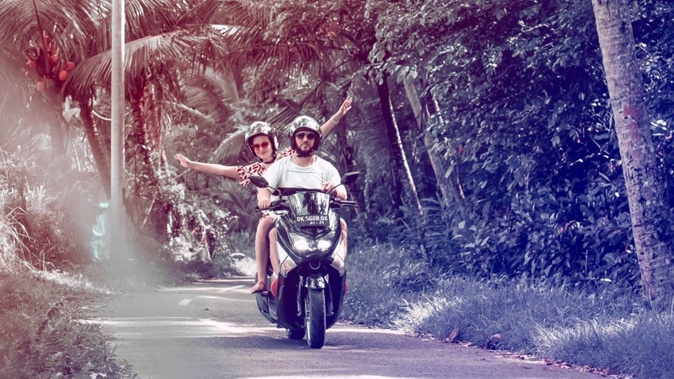
After a slew of motoring incidents and a proposed ban on tourists hiring self-drive mopeds, it’s clear that the resort island of Bali is still coming to terms with the return of international tourists.
With the Indonesian tourism industry celebrating the return of 2.1 million visitors in 2022, following the Covid travel shutdown, there has been a less welcome resurgence.
There have already been over 170 traffic violations this year involving foreign moped users driving without helmets or licences. The spike in unruly foreign road users led Bali Governor Wayan Koster to propose a ban on foreign drivers hiring motorbikes entirely last week.
The same week, police released video of a confrontation with a US national, Bryan Ronald William, who was stopped for driving a motorbike without shirt or helmet.
The cheeky tourist was recording accusing the traffic officers of looking for bribes. “You want money,” he can be heard saying in Indonesian.
In a separate incident an Australian moped rider, identified by the Coconuts Bali news site as Marita Leaning Daniell, was stopped for riding a moped without a helmet. The Australian expat claimed she had been living in the country for 23 years and had never been stopped for riding without a helmet.
It’s not just on the roads but also in Bali’s temples and beaches that tourists have been returning with some less than welcome habits.
While the moped ban is still pending the local tourism body took an opportunity to remind visitors of faux pas that could result in fines, or worse.
Last weekend the Balinese Tourism Board published a list of six rules addressing the most common problems with visitors.
“Due to several recent cases the Balinese government has been forced to impose strict penalties for tourists violating these laws,” read the PSA message.
- This popular activity could get you kicked out of Bali
- How to get a discount on LA flights, French tours, Bali villas and more
The six rules for returning Bali tourists
The tourism board published six areas which foreign visitors most regularly fell foul of local law.
- Always wear a helmet on a motorbike
- Avoid drunk and indecent behaviour in public
- Do not post offensive, vulgar pictures to social media
- Confine skimpy beachwear to appropriate venues
- Working without a visa is strictly prohibited
- Respect the local people and our culture
Currently the maximum fine for riding a moped without helmet is IDR250K or $25, which many visitors see as not enough of an incentive to follow the road rules.
While many of these rules should be commons sense to tourists , including observing terms of visas and motoring laws, others are particular to Indonesia and Bali.
In Indonesia it is illegal and punishable by fines to share negative or offensive content online, according to Indonesia’s strict rules on defamation. Similarly there are strict fines for distributing material online that is considered a “violation of morality”, such as nudity or culturally insensitive content.
While prosecutions are rare, it is not unheard of for authorities to use the ITE law to prosecute social media “influencers” and foreign visitors in the islands.
Petra Mahy of Monash University recently published a paper on the phenomenon of visitors’ social media being used as a lightning rod for online morality laws, saying “influencers face a risk of community-led regulation, via an online backlash, should they transgress perceived moral boundaries.”
The paper, titled Influencing the Influencers, described how content online was being used to educate and warn visitors of problematic behaviour.
However, most tourists without an online platform do not seem to face the same level of scrutiny.
Take your Radio, Podcasts and Music with you









